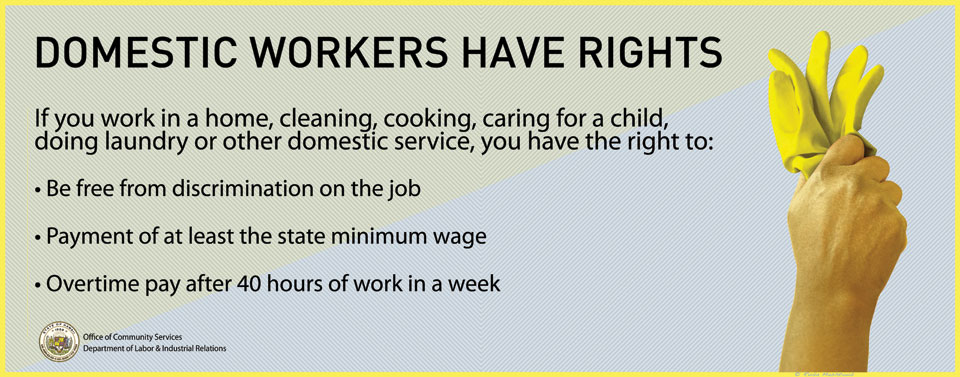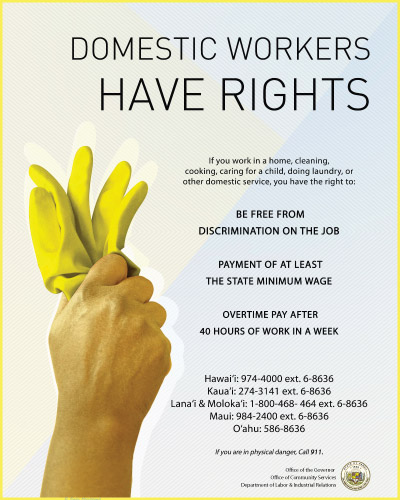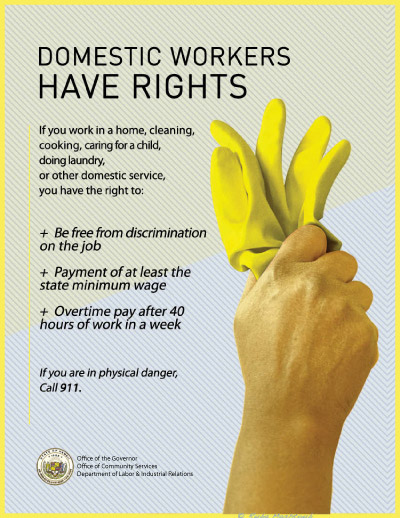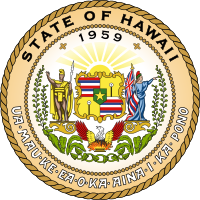Domestic Workers Rights

More Information
Two Acts were passed this year relating to laws enforced by the Wage Standards Division:
Act 70 – Regular Session – Relating to Wages. Requires employers to provide employees with specific wage and employer information in employees’ pay records; requires employers to maintain accurate and timely wage recordkeeping. Effective January 1, 2014. (SB332 HD2)
Act 248 – Regular Session – Relating to Labor. Establishes basic rights and protections for domestic service workers. Effective July 1, 2013. (SB535 HD2)
Do employers have to do anything differently?
Yes.
As of January 1, 2014, employers will need to provide additional information on their pay statement to employees. Act 70, amended the wage and hour law, Chapter 387, Hawaii Revised Statutes to require employers to report additional information on their pay stubs including the rates of pay and the total hours, as well as listing the employer name and address on the pay statement. The Division has provide a sample pay statement as an example of what has to be included and what has changed on the Division website under “Guidelines” or at https://labor.hawaii.gov/wsd/files/2013/07/Notice-Act-70-Pay-Statements-6-24-13.pdf
As of July 1, 2013, if you employ domestic service workers in your home you must pay them minimum wage and overtime after forty hours a week. This applies to “live-in” domestic service workers and those who work in your home but return to their residence at night. The new requirement to pay minimum wage and overtime to domestic workers you employ in your home does not apply to “casual” domestic workers, companionship workers, or babysitters, unless babysitting is their vocation. Casual domestic service workers work intermittently and irregularly and do not work more than twenty hours a week.
Individuals who employ domestic service workers in their home, are now considered employers under Chapter 387, Hawaii Revised Statutes, and are subject to the same notice requirements and other provisions in the law. There is more information about employer requirements in the New Employer Packet on the Department of Labor and Industrial website at labor.hawai.gov
What about employees?
After January 1, 2014, all employees should see a change in their pay statement that provides information about their paycheck and the amount of wages being paid. The employer’s name and address should be on the pay stub along with hours you worked and the rate of pay you received. Note: Some pay stubs may already be in compliance with the new law.
If you are a domestic service worker, you are eligible to receive minimum wage ($7.25) for all hours worked and overtime (1-1/2 of your regular rate) after 40 hours a week under the Hawaii Minimum Wage and Hour Law. If you are not receiving minimum wage or overtime for work you performed after 40 hours a week, please contact the Wage Standards Division to file a complaint at [email protected] or 808-586-8777.
- Pamphlet: “What Domestic Service Workers Need to Know About” (October 2013)
- Photocopy of Act 248, signed into law July 1, 2013
OCS, by law, provides human service programs for Hawaii’s economically disadvantaged, immigrants, and refugees. OCS contracts a wide array of services to non-profits serving these populations. Beginning July 1, 2013, OCS launched IRCs in four locations across the State, with recent immigrants (including “COFA” migrants) as their target populations. These centers serve as “multicultural navigators” that connect newcomers to the resources, services, and opportunities that they need to fully participate in the economic, civic, social and cultural life of the Hawaii community. The centers are staffed by bilingual or multilingual outreach workers and case managers. IRC services include, but are not limited to, outreach, intake, assessment/case management, supportive counseling, information and referral services, and formal acculturation programs.
In our view, the target populations of the IRCs substantially overlap with the target population of the Domestic Workers right law, defined as individuals who perform domestic work in or for a household or households, whose demographics are largely (1) women and girls from (2) developing countries and (3) disadvantaged communities, many of whom are (4) Limited English Proficient (LEP), and some of whom are (5) undocumented immigrants.
The goals of the Domestic Workers Rights law and our IRC objectives are congruent: The law’s goal is to promote and protect the human rights of domestic workers, while the IRCs work toward increasing awareness of this target population about their rights, including many other statutory protections, such as wages and hours laws, OSHA, access to health care, resources in domestic violence, and sexual assault situations, human trafficking issues, and other related issues.
OCS and its IRC service providers recognize that this target population is particularly vulnerable to discrimination and exploitation with respect to conditions of employment and human rights violations. OCS and its IRC service providers also recognize the importance of educating domestic workers about their rights and the general public as well as a preventive measure.
The IRCs employ bilingual and multi-lingual staff who have been carefully selected for their abilities to provide culturally and linguistically appropriate and effective outreach and public information.
Get Help
Immigrant Resource Centers
HAWAII
62 Kino’ole St.
Hilo, HI 96720
Phone: (808) 961-7030
KAUAI
9875 Waimea Rd.
Waimea, HI 96796
Phone: (808) 338-0252
4-1112 Kuhio Hwy.
Kapaa, HI 96746
Phone: (808) 821-2520
OAHU
1485 Lanapuni St. Ste. 105
Honolulu, HI 96819
Phone: (808) 841-6177
91-1841 Fort Weaver Rd.
Ewa Beach, HI 96706
Phone: (808) 681-3500
Department of Labor and Industrial Relations (DLIR)
830 Punchbowl Street
Honolulu, HI 96813
- DLIR Office of Community Services
Phone: (808) 586-8675 - DLIR Hawaii Civil Rights Commission
Phone: (808) 586-8636 - DLIR Wage Standards Division
Phone: (808) 586-8777
Downloads
 Poster (16″ x 20″) – Download (901 KB)
Poster (16″ x 20″) – Download (901 KB)
 2-sided Card (4.25″ x 5.5″) – Download (377 KB)
2-sided Card (4.25″ x 5.5″) – Download (377 KB)

